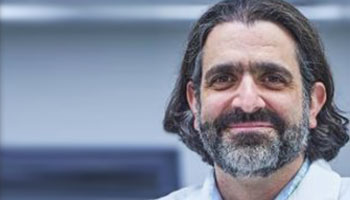HOW CAN WE HELP YOU? Call 1-800-TRY-CHOP
In This Section
MIS-C Study, Hartwell Investigator, Lady Barbara Colyton Prize for Autoimmune Research, Brain Tumor Biology, Acute Kidney Injury
 mccannn [at] email.chop.edu (By Nancy McCann)
mccannn [at] email.chop.edu (By Nancy McCann)
In this week's roundup of research headlines, read about Children's Hospital of Philadelphia's participation in a MIS-C study on long-term outcomes, and who among us has received prestigious research awards. Learn about the link between acute kidney injury and brain injury in diabetic ketoacidosis, as well as new insights into pediatric brain tumor biology.
CHOP To Participate in Multi-institution MIS-C Research Study

Matthew Elias, MD
CHOP is proud to be a major participant in the multi-institutional Pediatric Heart Network research study "MUSIC," which stands for Long-TerM OUtcomes after the Multisystem Inflammatory Syndrome In Children. The primary investigators for CHOP are attending cardiologists Matthew Elias, MD, and Therese Giglia, MD, FAHA. This trial is part of a comprehensive strategy by the Department of Health and Human Services and National Institutes of Health to understand pediatric COVID-19 and the subsequent syndrome, MIS-C, as quickly and effectively as possible.
The MUSIC trial will be the first study to provide long-term outcome data on MIS-C, which is generally believed to be a delayed immune response to an acute COVID-19 infection and is characterized by a severe inflammatory response, often in otherwise healthy children. Children with MIS-C frequently develop shock and ventricular dysfunction, along with coronary artery aneurysms and arrhythmias less commonly. The study will include approximately 600 children from across the United States and Canada, and at least 29 institutions.
"We have witnessed children with MIS-C become critically ill with shock and ventricular dysfunction, requiring intensive care," Dr. Elias said. "We look forward to this collaboration from across the United States and Canada to study this syndrome, and in the process, further understand this disease and improve management strategies for our patients."
Click here to learn more.
And the Award of Excellence Goes to …

Neil Romberg, PhD
Neil Romberg, PhD, the Jeffrey Modell endowed chair of Pediatric Immunology Research at CHOP! Each year, the Perelman School of Medicine at the University of Pennsylvania chooses by committee, faculty who exemplify the highest values of scholarship, teaching, innovation, commitment to service, leadership, professionalism, and dedication to patient care. And this year, our own investigator, Dr. Romberg, received the Lady Barbara Colyton Prize for Autoimmune Research, which is awarded to a faculty member who has conducted outstanding research in autoimmune diseases.
Dr. Romberg, who is also on faculty at Penn's medical school, investigates the regulatory mechanisms enabling our immune systems to fight infections without injuring ourselves. He is particularly interested in the immune system of patients with primary immunodeficiency who are susceptible to both life-threatening infections and autoimmune diseases. Dr. Romberg is among the top immunologists in the country, and his research has led to the identification of three new rare diseases.
"It is an honor to be recognized for our work in the field of human autoimmune diseases," Dr. Romberg said. "The credit really goes to the members of the Laboratory who dedicate the near entirety of their waking hours to finding creative ways to help patients with autoimmune diseases and also to the patients who are full partners in this work. The patients teach us so much about how the immune system should work and the consequences when it doesn't. It's been a real team effort, and I'm fortunate to coach a team of all-stars."
Learn more here.
New Insights Into Pediatric Brain Tumor Biology

Adam Resnick, PhD
CHOP took part in the first large-scale multicenter proteogenomic study focused on pediatric brain tumors, which are the leading cause of cancer-related deaths in children. Researchers from the Clinical Proteomic Tumor Analysis Consortium (CPTAC) and Children's Brain Tumor Network (CBTN) of which CHOP is a member institution, collected and analyzed genetic, genomic, and proteomic data from multiple types of brain tumors in children.
This comprehensive proteogenomic analysis of the proteins, genes, and RNA transcription involved in pediatric brain tumors provides a more complete understanding of these tumors, and the findings could help physicians more accurately identify different types of tumors and methods for treating them. The study, published online in Cell, was co-led by Jay Storm, MD, and Adam Resnick, PhD, of CHOP's Division of Neurosurgery, along with Brian Rood, MD, of the Brain Tumor Institute at Children's National Hospital, and Pei Wang, PhD, from Icahn School of Medicine at Mount Sinai.
"The driver of this joint study has been a commitment to data-sharing and open science," said Dr. Storm, co-lead author and chief of Division of Neurosurgery, and Dr. Resnick, scientific co-chair for CBTN. Both doctors are co-directors of CHOP's Center for Data Driven Discovery in Biomedicine (D3b), which is the Operations Center team for the CBTN. "Coming together has given both CPTAC and CBTN an opportunity to expand our available resources for answering critically important biological questions. Harnessing the collective expertise across these consortia enables us to accelerate discovery, improve the process of target protein identification, and ultimately improve cancer treatments."
The consortia also includes the Icahn School of Medicine at Mount Sinai, National Cancer Institute, Fred Hutchinson Cancer Research Center, and Children's National Hospital.
Learn more from this National Cancer Institute press release.
Ingo Helbig, PhD, Receives Prestigious Biomedical Research Award

Ingo Helbig, PhD
Virtual high-fives go out to CHOP pediatric neurologist Ingo Helbig, PhD, — one of only 11 researchers recognized nationwide in 2020 — to receive the prestigious Hartwell Individual Biomedical Research Award. Made possible by The Hartwell Foundation, this award provides funding for innovative, early-stage biomedical research with the potential to benefit children of the United States, specifically seeking to fund innovative and cutting-edge applied research that has not yet qualified for funding from traditional outside sources.
Dr. Helbig, director of the Genomic and Datascience Core of the Epilepsy Neurogenetics Initiative (ENGIN), received the award for his research proposal "Delineating Subgroups and Outcomes in Neurodevelopmental Disorders through Computational Phenotypes."
Within his Hartwell project, Dr. Helbig aims to understand how large-scale clinical information, including data derived from thousands of patients from their electronic medical records, can be meaningfully combined with genomic data to understand the causes, outcomes, and natural histories of neurodevelopmental disorders, including conditions such as developmental delay, ADHD, autism spectrum disorder, and epilepsies. He plans to use the tools and methods for understanding large-scale clinical data to better delineate the clinical features in children with genetic epilepsies that he and the other ENGIN team members see in clinic.
"Over the last decade, hundreds of novel genetic causes for neurodevelopmental disorders have been discovered, and genetic testing can now be performed on an industrial scale," Dr. Helbig said. "However, our understanding of the clinical features and natural histories of the conditions we have identified is lagging far behind, and many questions regarding natural history and outcomes remain unsolved. Large-scale resources for clinical information such as electronic medical records are available, and we will use computational techniques to mine these datasets. Our initial results already show that many genetic neurodevelopmental disorders have distinct footprints that can be identified."
To learn more about Dr. Helbig's research go to CHOP News, and read his research blog "Beyond The Ion Channel."
Acute Kidney Injury During Diabetic Ketoacidosis Linked to Brain Injury

Sage Myers, MD
Analyzing data from a large, multicenter clinical trial, researchers from a consortium of hospitals including CHOP found that children who experience acute kidney injury during diabetic ketoacidosis are more likely to also experience subtle cognitive impairment and demonstrate lower IQ scores, suggesting a pattern of multiple organ injury. The findings appeared online today in JAMA Network Open.
"With 13 participating emergency departments in the Pediatric Emergency Care Applied Research Network, we had the ability to not only study the frequency of acute kidney injury in these children," said first author Sage Myers, MD, an attending physician in the Emergency Department at CHOP, "but also the underlying factors associated with injury, and whether there is an association between the occurrence of acute kidney injury and cerebral injury, which would suggest a possible linkage between the mechanisms of injury underlying both."
The researchers studied over 1,300 episodes of diabetic ketoacidosis in children and found that 43 percent involved acute kidney injury. Over 250 of those episodes represented more severe cases of kidney injury. When assessing whether acute kidney injury was associated with cognitive issues, children with kidney injuries had lower scores on short-term memory tests during diabetic ketoacidosis, as well as lower IQ scores three to six months after recovering from the condition. These differences persisted after adjusting for the severity of diabetic ketoacidosis and demographic factors such as socioeconomic status.
Learn more in this CHOP press release.
Five CHOP Clinician-Scientists Welcomed by American Pediatric Society
The mission of the American Pediatric Society (APS) is to shape the future of academic pediatrics through engagement of distinguished child-health leaders to represent the full diversity within the field. APS President Steven Abman, MD, welcomed 55 new members joining the prestigious academic pediatric organization, including five from CHOP: Alexander Fiks, MD, MSCE; Cynthia Mollen, MD, MSCE; Yaël Mossé, MD; Audrey Odom John, MD, PhD; and David Teachey, MD.
They will be recognized during the APS Presidential Plenary May 3 at the Pediatric Academic Societies 2021 Virtual Meeting. The APS has 1,800 plus members who are recognized leaders of extraordinary achievement working together to shape the future of academic pediatrics. Founded in 1888, the APS is the first academic pediatric organization in North America.
Read more in the press release.
ICYMI
Catch up on our headlines from the Nov. 20In the News:
- Genetic Clues Revealed for Schizophrenia Risk in 22q11.2 Deletion Syndrome
- Penn's Outstanding Faculty Mentoring Award Recognizes Matthew Weitzman, PhD
- New Study Finds Significant Proportion of Neonatal E. coli Infections Resistant to Common Antibiotics
- American Pediatric Society Honors Lisa Young, MD
- New Study Finds Further Research Needed to Assess AAV Gene Therapy's Long-term Safety
- Precise Treatment Targets Genetic Pathway and Resolves Patient's Debilitating Symptoms
Keep up with our news, stories, and updates in real time by following us on Twitter, Facebook, LinkedIn, or Instagram. Or subscribe to our newsletter to get an email sent every other Friday by signing up here.


